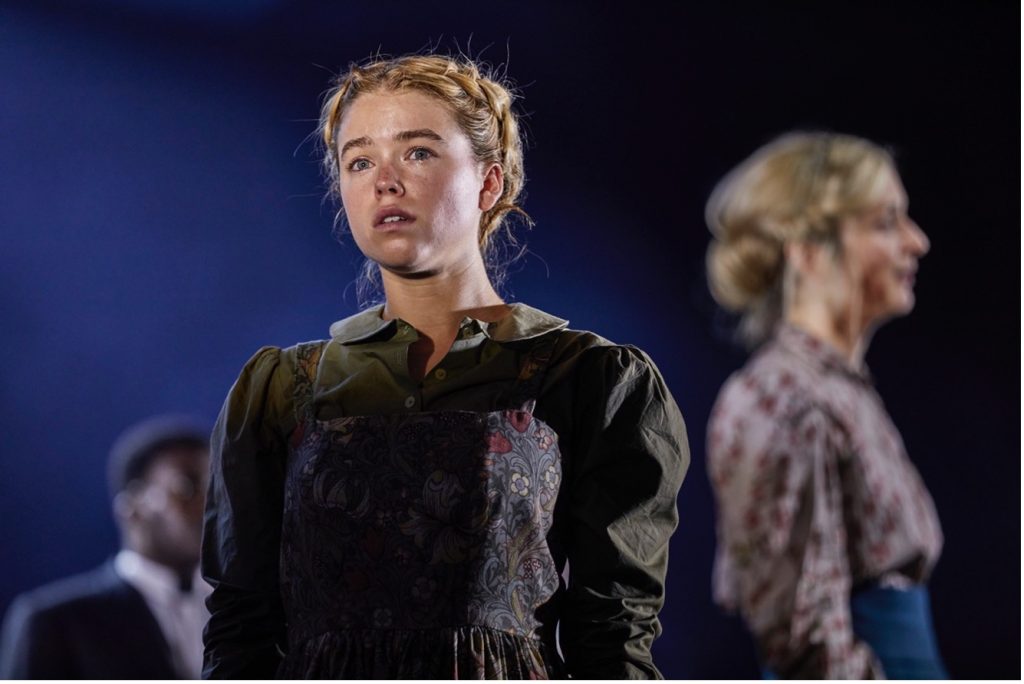
‘Bringing heaven down’: The Crucible Review
by Irina Radulet | July 9, 2023
The stage is weeping rain, cold and blue. Behind the sheet of rain, a pair of candles glimmer on a frugal table. This breath-taking set, the work of Es Devlin, places us in Salem – in that dark, ascetic, stifling environment where only the rain is allowed to dance as it tumbles from the sky, and where the simple act of young girls cavorting in the forest after dark threatens to overturn the whole fragile theocracy.
Lyndsey Turner’s production gets off to a wobbly start, but it soon finds its feet. It opens with Arthur Miller’s own overture, which the actors take turns to recite. “The edge of the wilderness was close by. The American continent stretched endlessly west, and it was full of mystery for them.” The decision to include Miller’s overture lays the scene powerfully, placing us in a land in which religion offers protection from fear and mystery; however, it also feels as though the production lacks faith in the play to deliver its own message. We do not need Miller’s voice ringing out among the chorus of voices. They are potent enough in their own right.
The entrance of Abigail, played by Milly Alcock, sets the play in motion. In Mrs Proctor’s words, Abigail is “something soiled”. This is a damning judgement to pass on a 17-year-old, even one who flirts with John Proctor as her cousin lies ailing on her deathbed. In Abigail’s words, Proctor “took me from my sleep and put knowledge in my heart,” awakening her from the straitjacket of blind Puritan obedience. Miller would have us believe that the Salem witch trials emerged out of ‘the guilt of illicit sexuality’; he ages Abigail up from 11 to 17 in order to lend credibility to her affair with Proctor. Sexual or not, it is certainly ignorance that leads to the accusations. Later in the play, Mary Warren (a wonderful Nia Towle) tells the Proctors that she “never knew anything before.” The trials provide the young women of Salem with a sense of moral purpose that extends far beyond their domestic establishments. It is a heady authority, one they could never have hitherto hoped to exercise, and thus proves irresistible.
In its depiction of the young women of Salem, Lyndsey Turner’s production fizzes with electricity. A gaggle of girls sit like a menacing jury in the background, watching on ominously as the play unfolds. The contrast between their innocent pink pinafores and plaits, and their sinister mission makes for some striking visuals. The scenes of group hysteria are wonderfully rendered. As the girls shout out, the names of the accused get swallowed up by the eerie pitter-patter of the rain. Judge Danforth (Matthew Marsh) declares it “the voice of heaven speaking through the children.” John Proctor has another name for it: “you are bringing heaven down and raising up a whore,” he tells the judges. It is a verdict that costs him dearly, as he and his wife find themselves accused.
In the hands of a weaker actor, Proctor runs the risk of appearing like a man who won’t clean up his mess, a figure of derision rather than pity. Brian Gleeson, however, has a warmth about him. In his hands, Proctor becomes the everyman, flawed yet redeemable. “There is a promise made in any bed,” Proctor’s wife warns him, and these must be its terrible consequences.
The Crucible’s sexual politics are tricky to navigate, and sometimes come across as dated. Abigail is unredeemable, yet she is driven to such a pitch of frenzy by a man who has sex with her while his wife is suffering with post-natal depression. And one of the scenes that I found hardest to watch was Elizabeth berating herself for sending Proctor into Abigail’s willing arms: “I was a cold wife,” she says, implying that her coldness pushed him away. Such a judgment is echoed by Judge Danforth: “be there no wifely tenderness within you?” It makes for painful viewing, but also adds a powerful and important layer to the play’s exploration of injustice; the witch trials are a terrible culmination of feminine hysteria, and yet when women do not weep and clamour they are still viewed as equally unnatural.
Played by Caitlin FitzGerald, Elizabeth Proctor is a character so good and righteous that I doubted I could warm to her. Yet the scenes between her and Proctor are tenderly, painfully executed. For once in this clamorous play, the air teeters from the weight of the unspoken. This stands in stark contrast to the highly physical, constantly frenzied Abigail. The only time when Abigail (Milly Alcock) left me wanting more was the moment when Proctor publicly repudiates her: “she thinks to dance with me on my wife’s grave.” It is a powerful accusation, and yet it hardly seems to change Abigail’s behaviour. She has had people hanged, harbouring the belief (however delusional) that once Proctor’s wife is dead, she will be able to marry him. Now that Proctor has shattered that dream once and for all, I expected disappointment, frustration, wrath. Her idol has fallen, and all her labour has been in vain. Abigail’s lack of reaction suggests that in Turner’s production, the hysteria has escaped Abigail’s hands, and has gained a terrible momentum all of its own.

In the second half, the scenes with just the men, the clergy, and magistrates, lose their dynamism and momentum. Reverend Hale (Fisayo Akinade), initially speaking in the conventional voice of Puritan authority, becomes the play’s ringing conscience. He was perhaps inspired by the real-life Samuel Sewall, one of the original judges, who later publicly repented. But authorities like Sewall were the minority. In 1704, another judge, Deodat Lawson, proudly republished a sermon – ‘Christ’s Fidelity: The Only Shield Against Satan’s Malignity’ – that he had initially given during the Salem trials. In his overture to The Crucible, Miller shows some sympathy towards Salem’s patriarchy: “[t]heir fathers had, of course, been persecuted in England. So now they and their church found it necessary to deny any other sect its freedom; lest their New Jerusalem be defiled.” This adds a layer of complexity to the play. Abandoned by their motherland and on the edge of a dark and unexplored forest, Salem’s inhabitants attempted to tame the unfamiliar world around them through law and order, perverting these instruments in the process. Lyndsey Turner’s The Crucible seems undecided about whether it was girlish hysteria or patriarchal authority that was more to blame for the panic that gripped Salem. It would have been interesting to have Turner’s own judgement come through more.
Although the case can be made that Turner’s production took few risks, there is nevertheless something admirable in this restraint. It is true that it didn’t add to the discussions and debates surrounding the play, but it made for a near-perfect viewing experience. The production focused on perfecting the atmosphere, bringing Salem brilliantly, startlingly, to life. The set (Es Devlin) and lighting (Tim Lutkin) were impeccable – in one memorable scene, the young girls are shadows dancing around a cauldron, lit up like a Renaissance painting. Turner also succeeded at tapping into the play’s rich vein of comedy running just behind the darkness and paranoia, with characters such as Giles Corey adding some much-welcomed comic relief. Despite running for almost three hours, not a single minute of the play felt wasted. The Crucible is one of the best productions I’ve seen in the West End for years. Miller’s classic hasn’t lost its appeal, continuing to speak to new generations. As he wrote in Echoes Down the Corridor: “[c]ertain farms which had belonged to the victims were left to ruin, and for more than a century no one would buy them or live near them.” Centuries after the last witches have been hanged in the West, The Crucible’s haunting aftertaste continues to linger and enthral.
The Crucible, directed by Lyndsey Turner, is showing at the Gielgud Theatre, Soho, until 2 September 2023.
Featured image: The Crucible West End. Credit Brinkhoff-Moegenburg.
Words by Irina Husti-Radulet.




